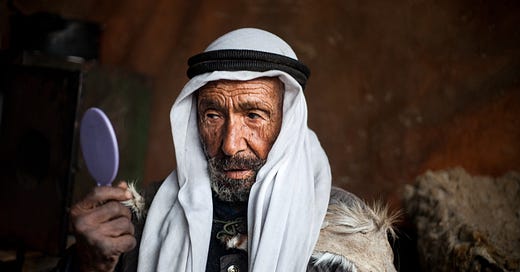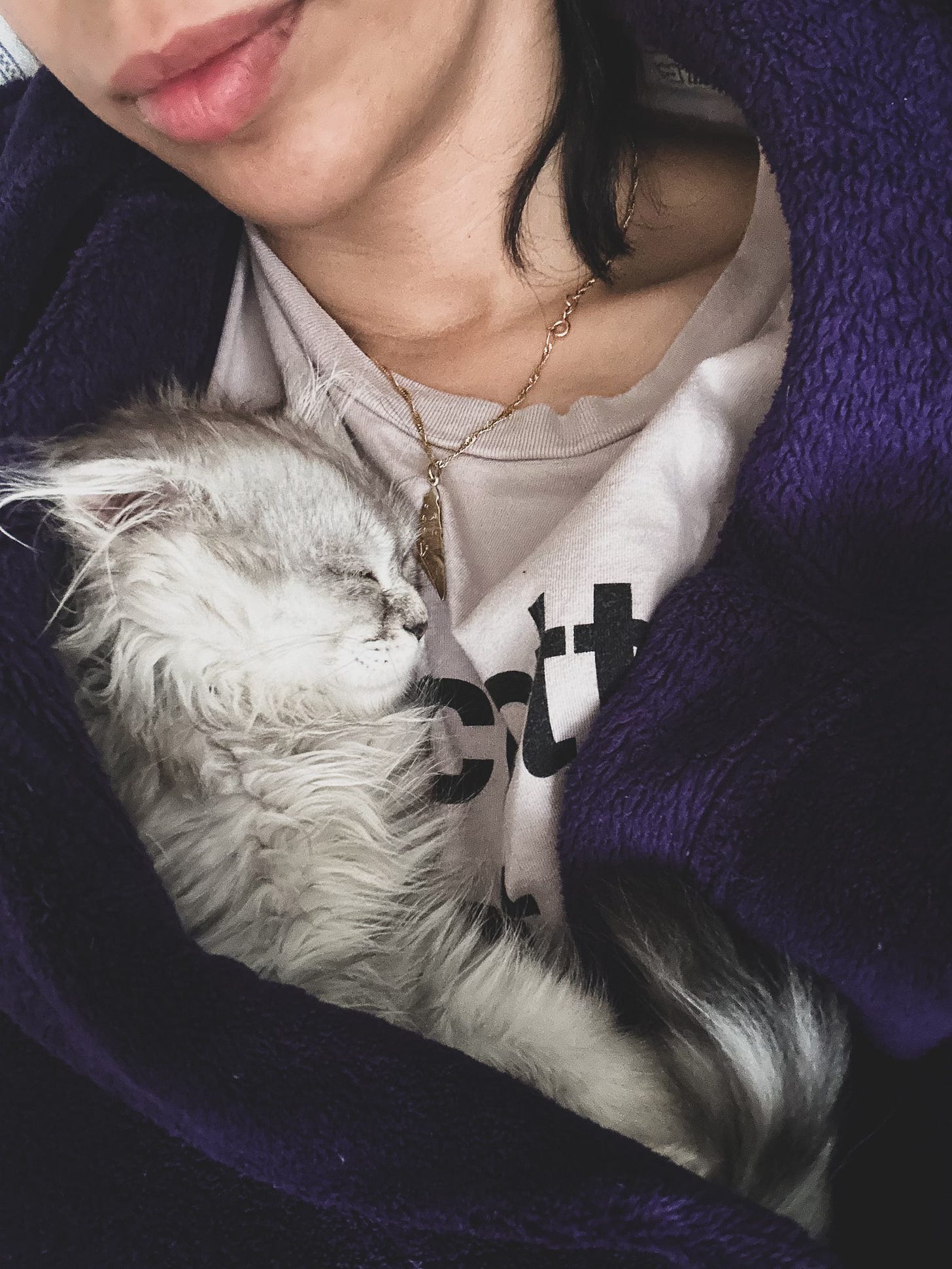The Men We Forgot to Grieve
How I Did the Dirty Work of Erasing Our Men … Until I Saw Them Whole
© Eman Mohammed
4:03 a.m. — Dublin
I hear a kitten purr.
It’s Zaytoun, my 9-week kitten, who, unlike the rest of the world, seems to know he’s safe. His tiny body curls into mine like a comma where a sentence of despair should end. He’s my first official support animal, among the three cats I now live with.
He showed up in our lives like a little spark, convincing even my two other dramatic, overweight cats, Falafel and Hummus, to move themselves and do something besides chewing and judging.
I’ve been giving them speeches about what cats go through in Gaza. Real resistance training. I catch myself mid-rant sometimes, wagging a finger at them like they’re my kids “You know what your cousins back home deal with?”
Am I officially insane? Talking to cats about settler colonialism and discipline?
Probably. But what else do you expect at 4 a.m., when the genocide never really stops?
⸻
4:27 a.m. — Dublin
I don’t want the night to end. I don’t know what morning is supposed to mean anymore if Palestine is still caged and bleeding. My insomnia doesn’t just keep me awake, it drains me dry.
Earlier I called home. No one picked up. I sat with the ringtone like it was a person, playing it over and over in my head, memorizing the silence that followed and my deep sigh in protest.
My family and I, we’re different now. Two years of genocide, forced starvation, and Zionist terror didn’t just shift the fault lines between us, they split them wide open, deeper than decades of silence or performative peace ever could They were often disappointed in the decisions I made, but rarely surprised by me. Ironically, they were surprised that I became exactly what generations of fierce Palestinian women raised us to be: uncompromising, relentless, full of contradictions and grit.
⸻
5:01 a.m. — Dublin / 7:01 a.m. — Gaza
My eyes go over old photos of our family، all women. This family-my mom’s side- doesn’t have many men. Unlike other families in Gaza, the men in ours either passed away too early or walked away altogether. That absence built something in me and also took something.
For years, I unconsciously contributed to the dehumanization of our men. Not on purpose، but because I believed I didn’t know them well enough to write or speak about them. I was taught to question them. The colonizer and his systems made sure we saw them only in extremes: abusers or martyrs, broken or violent, protectors or ghosts.
I told myself it wasn’t worth mentioning that in Gaza, random men on the street call me benti- بنتي “my daughter.” That during the PA’s rule, they’d make sure I never walked alone at night because they knew. They knew what kind of danger stalked us and stepped in the way.
Even at my katb kitab- the formal Islamic marriage contract ceremony where a woman is expected to be represented by a male guardian, my father didn’t show up. He chose absence, again. But our male neighbors stepped in without hesitation. They didn’t just represent me, they جبروا بخاطري. They lifted my spirit when it was bruised. No loud words. No staged honor. Just love in the form of presence, dignity, and protection. The kind that fills in what was broken without asking for credit.
Many PA officers weren’t even from our neighborhoods, they were planted, designed to normalize surveillance, not safety. They didn’t protect our traditions. They destroyed them.
Palestinian men’s love language was tricky to read at times, quiet, unscripted, easy to miss if you didn’t know where to look. But you could always feel it.
They mixed that fatherly instinct with stern tradition. They spoiled their daughters and scolded their sisters, not out of superiority but out of survival reflex. They didn’t say “I love you.” They peeled plates of fruit in silence. Showed up with hummus and falafel every Friday morning. Brought cold soda in summer without asking what you liked. Stood in line for a stranger at the bank because “a woman shouldn’t have to deal with this.”
They didn’t use fancy words. They brought college money folded in their pockets and left it on the table without explanation. They knocked on doors with hands full and hearts heavier. They carried emotional scars so deep, they didn’t even know it was pain, just the way a man is supposed to feel.
We say Palestinian women are the backbone of the struggle. True. But our men? Our boys? They split like the sea to make room for us in the streets. They held our grief with clumsy, beautiful hands. They were silent when silence was survival, not because they didn’t care.
I used to think I didn’t know them.
But I did. And I loved them.
⸻
5:40 a.m. — Dublin
Now I scroll through our Gaza journalist groups, and what do I see? Photo after photo of men and boys, dead. Mutilated. Lying in the street with bread still clutched in their hands.
A lot of them were killed by the zionist army looking for food. Some while comforting others. Some while holding back tears in voice notes, saying “stay strong” like it wasn’t costing them everything.
These are our men. Flawed. Tender. Real. They’re ours, and we love them as they are.
I look at their faces and ask myself, do I know them?
They’re my age. But they look 20, 30 years older. That’s not genetics. That’s genocide. That’s what happens when you’ve lived in a cage for your entire life while the world debates your humanity.
I haven’t lived in Gaza for a decade now. Even though guilt chews through my bones like it’s owed something, I know I haven’t faced what they face every day. Still, something in their faces is familiar. A muscle memory. A shared code.
Or maybe I just want it to be.
Maybe the dust, blood, and rubble disguised them too well. Maybe I stopped recognizing them because their faces aged faster than my memory could keep up.
⸻
6:00 a.m. — Dublin
I wonder if this is a glitch in my memory. Or just a nightmare that’s stretched too long. Two years… seventy-seven years… what’s the difference when your people are always bleeding, and the world keeps saying “both sides”?
Even living feels like a burden we carry with clenched teeth and cracked backs.
This genocide taught me I’m still naïve. That despite everything -the war, the survival, the grief-I still managed to be shocked. I thought surviving ethnic cleansing made me sharp. But here I am, surprised again, betrayed by my own expectations.
Flashbacks don’t knock anymore. They just show up, every night before bed, and every morning before breath.
And I don’t know if I want them to leave.
⸻
6:30 a.m. — Dublin
If I let myself float for a moment, I find my body walking Gaza’s streets on a Friday, roaming the restaurants where we got greeted by people who look like they were waiting for us, If the owner is ready to close and sees our group from a distance, they smirk and ask how hungry we were to estimate if we deserve a table at this late hour.
At 20, I thought I reversed my family’s Nakba. I got my own place. It used to be a dusty, unwanted commercial office, but I looked at it and saw a home. It was just a few streets from my mom’s- close enough for guilt, far enough for freedom.
Every time I passed that place before it was mine, I stared at it the way I stared at men I loved, believing it could be something it wasn’t yet.
This place didn’t disappoint.
I knocked down walls, built furniture with my hands, painted over old trauma. My family? They were the “hire someone” type. But I needed to build something of my own, something that didn’t need permission to exist.
It became an addiction, like tattoos. Expensive. Permanent. Liberating.
⸻
6:52 a.m. — Dublin
The windows faced the street so I could hear all the juicy stories. Morning gossip, late-night secrets. I’d sip fruity tea while the girls (my daughters) woke up like clockwork, one always trailing the other by just enough to keep me on my toes.
They were like all babies. Cute and boring. So I told them stories until their fear of the future got bored and let them sleep.
⸻
7:00 a.m. — Dublin
Maybe that’s what surviving means, talking to cats, dreaming of demolished homes, and loving people you barely recognize in photos because the genocide aged them faster than memory could.
Morning is here. Gaza is still burning.
And I’m still trying to remember the faces before the dust covered them.
We’re not just counting the dead.
We’re counting what’s left ..
and refusing to let it disappear.
I dial Gaza and let the line ring.
I pretend time still matters, that 7 a.m. here in Dublin isn’t 9 a.m. there, that I need to give my loved ones the courtesy of not calling too early.
Eib. عيب.
It would be rude. Inappropriate. Let them sleep.
As if sleep is even possible.
As if the Zionist drone buzzing in my head from 2014 isn’t still hovering above theirs.
As if I can believe, even for one second, that they get to dream.
But I still dial. Because I need to believe someone will answer.
⸻






mmm, i love when you write like this.
first "Am I officially insane? Talking to cats about settler colonialism and discipline?" oui, habibti. but it is right to educate them about resistance! the insane & absurd is the only way to live, otherwise what is the point, mm?
secondly
-- ah, the love language of men, there is a uniqueness in navigating that which wounds us, and the redemption of indigenous men. as i've studied dv through the lens of native ngos, it's been a worthy understanding to see the delicate dance b/t the oppressor's affliction, the ancient patriarchal traditions and the beautiful qualities which give them the strength to make room for women around them, in your case, the ferocity and wonder of Palestinian women
I am glad you writing these things. I'm glad your heart is moving through it.
sending hugs my friend.